
Being greedy is one thing, but slow websites can drive readers to distraction.
But being stubborn and refusing to accept reality is another thing altogether.
If you read your news online, you will know what I am talking about.
Many news websites sites are full of banner ads above the fold.
Far too many ads
All these ads cause the page to take an age to load.
Some news and information sites I try to read on my laptop are such slow websites that they simply refuse to load.
Or they can take a minute or more to appear.
Talk about poor user experience.
The problem is far too many ads above the fold.
Every ad needs to be uploaded from a separate web server.
Because of this, loading time stalls to a crawl.
Every blogger knows that website speed is vital to the success of their sites.
Yet news tycoons have yet to grasp the basic logic that slow websites are awful for readers.
If your page doesn’t load within 3 seconds, you lose visitors, so your ad income plummets.
The slow websites for news
Newspaper barons might think they are mighty.
But they are not as powerful as an Internet monopoly.
Google proved who was the boss when the Daily Mail lost 50% of its web traffic overnight.
It was blamed on a Google algorithm update.
But the truth is that the Daily Mail had been bending the SEO rules for a very long time.
It uses clickbait headlines and page titles that are three times as long as permitted by most search engines.
It also uses annoying pop-ups and overlay ads.
If that is not enough, every one of its web pages is filled with around 60% or more of advertising space.
While passable on a phone, I find the Daily Mail website unusable on a desktop.
Can you find the Daily Mail news story on the page below?
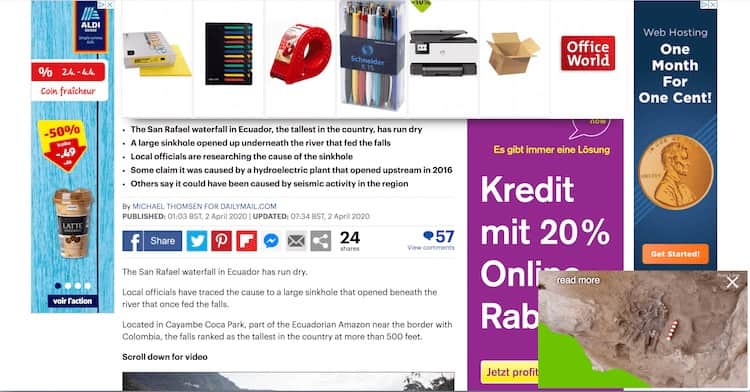
This ratio might be fine in print.
But it doesn’t work for online news.
The vast number of ads makes the Daily Mail website so slow and almost impossible to read.
Pop up ads
I like reading news stories.
But pop-up ads that cover the text I am trying to read and cause the page to jump drives me mad.
I have to give up and head elsewhere.
Perhaps you like using Google News to find international or local news like me.
But you know what a pain it is when you end up on a news site that is full of ads.
Some have more banner ads, video ads, and related site ads than news.
It’s an invitation to leave.
Killing the goose that laid the golden egg
I used to love reading The Independent. It was one of my favorite news sites.
That is, until it added so much advertising that its site would sometimes not even load on Safari, Chrome, or Firefox on a laptop.
Here is a Google Speed Insights test. It took around 8 seconds for the site to load on a desktop and over 16 seconds on mobile.
Here are the screengrabs of The Independent’s site load speed performance.
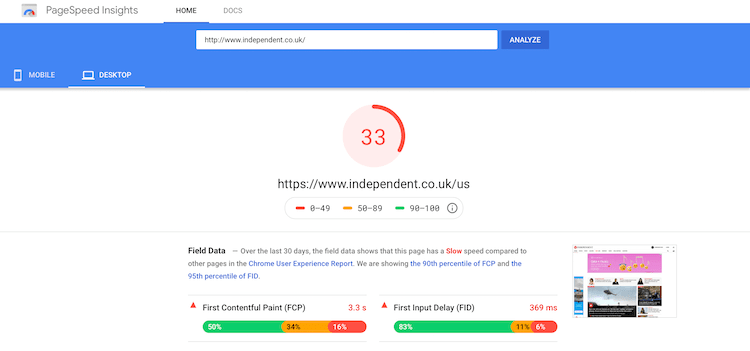
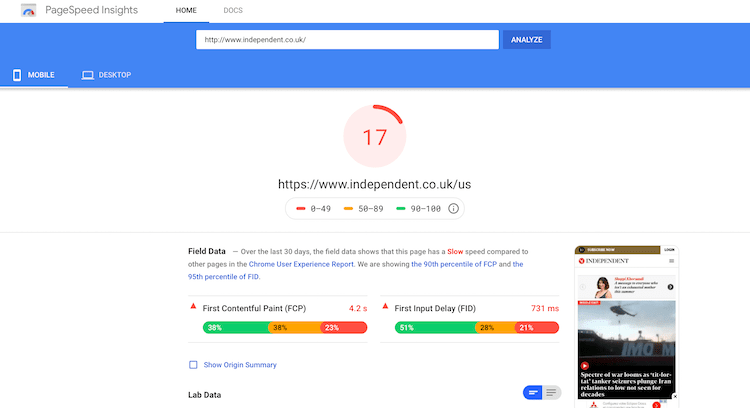
The website load scores were abysmal, and it failed every speed test.
Luckily though, The Independent must have hired some smart dudes later. Recently, its advertising delivery has reduced considerably, and its site performance has improved.
Perhaps its advertising revenue has increased too.
It’s old news
What’s the problem with advertising on some popular news websites?
It is that newspapers are trying to apply a very old business model to a new medium.
In print, newspapers sell advertising space. The more space they sell, the more money they make. It’s a simple business model.
But they don’t get paid for online advertising space. Income is only produced when someone with intent clicks on an ad.
User intent is the key ingredient in making money from online advertising, and intent is defined as someone interested in a page’s content and then clicks on a related ad.
For example, imagine a site visitor arriving on a page searching for information about Spain.
If the content matches their search, an ad for a holiday in Spain is related and will probably get a good click-through rate.
For newspapers, this creates a problem. How are all their ads related to the content?
A lot of unrelated ads on a web page are not the way to succeed in making money from online advertising.
Ads don’t always mean slow websites
Yes, ads need database queries and have to load javascript files. So there is always some small loss in loading speed.
But that doesn’t necessarily mean that you will have a slow website.
Many newspapers, like The New York Times, the Washington Post, Wall Street Journal, and USA Today, load quite fast.
News channels such as Fox News, CNN, and the BBC all carry advertising, but they load fine.
The reason these sites work better is that they have a better balance of news content and better placement of advertising. A little can go a long way.
Just be sure you have a very good web hosting service for your site. Then you can add Google Adsense or other advertising to your site without a big jump in load speed.
You have undoubtedly noticed that we have ads on Just Publishing Advice. But our site speed is still very fast.
Here are our site speed scores on Page Speed Insights.
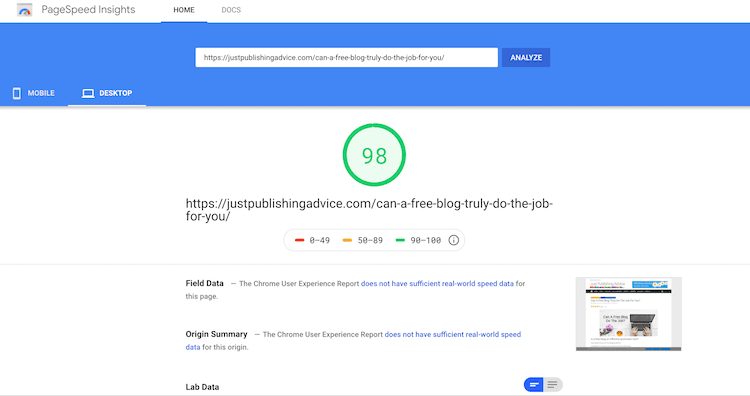
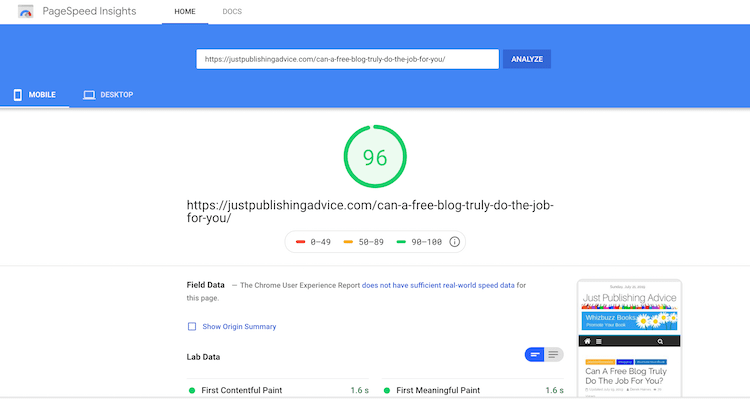
The scores prove that advertising in moderation does not dramatically affect your loading time.
The key phrase there was, in moderation.
None of the ads on our site appear above the fold on mobile. We also make sure that ads only load when they become visible after scrolling down through the content.
Google Adsense also helps us by only serving relevant ads for the content on our site.
The problem with many news sources is that they are loading multiple banner ads above the fold. Some use sidebar ads above the fold as well.
That is when ads take much longer to load and create very slow websites.
There are too many external requests as the page is trying to load.
More ads mean more money, right?
In fact, the opposite is true.
I have used Google Adsense for many years now. I can honestly say that you make much more money by serving fewer ads.
Multiple ads above the fold are a distraction from your content and lead to very high bounce rates.
In other words, people can’t find what they are looking for, so they leave.
If you have a monetized blog or website, be careful with your ad placement.
Make sure that your content loads first and fast.
The best ads to use are in-line article ads related to the page content. They only load when a page is scrolled down to where you place your ad.
With Adsense, you can have as many as you like. Google has removed the old rule of allowing only three ads on a page.
But usually, two or three is more than enough. If you have a very long article of over 2,500 words, you could perhaps go up to four.
Do you want a banner ad at the top of your page? Then use only one because it will definitely slow down your loading speed.
Don’t place additional ads in your sidebar or in the first ten paragraphs of your content.
Each one you add will slow down your site more because they will all be loading at the same time.
You can make money from advertising. But to do so, your ads have to be well-placed, relevant, and load fast.
When you have too many ads and a slow-loading website, your advertising revenue will reduce very quickly. Being greedy with ads is not smart.
Summary
Newspapers and the Internet have one thing in common. They both make money from advertising.
Without this income, both would perish.
But Internet companies and experienced website owners are a lot smarter than some newspaper owners.
Greed is not good when it comes to an advertising-supported online business or blog.
You need to be much smarter with your ad ratio and placement.
You need a lot of informative or entertaining content to satisfy your readers and site visitors.
Then you can place your ads intelligently to maximize your income.
And always check your site speed whenever you make changes to your ad placement or ratio.
If they result in your loading speed increasing to over three or four seconds, you will have a slow website.
If that happens, you will lose not only your visitors but also your ad revenue.
Related reading: What Are The Best Ways To Become An Online Publisher Today?
Share This Article
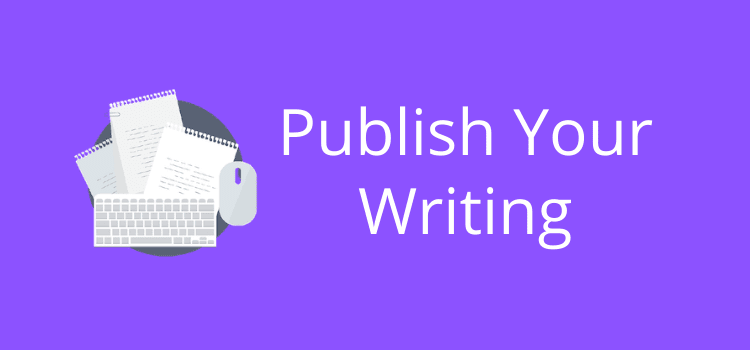
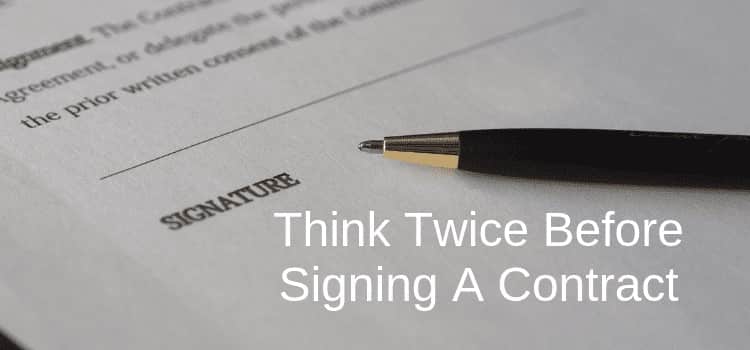

The most effective way for a company to lose my custom is to pop an advert up right over the top of an article I am trying to read. This is a Daily Mail speciality.
I don’t know if you’d included the Independent crossword in your analysis. From my recent experiences, about half my monthly PAYG data allowance is wasted on their constantly updating and refreshing sidebar ads. The majority of them seem to be for investment brokers – gold, CFDs (whatever they are) – as if the majority of us have spare cash to entrust to these people. The small print usually states that over 70% of the funds LOSE value. Well, I’m in … where do I sign?
I hate the vast majority of news sites so-called. Why? Because of the damned ads. If I see popup ads appearing, that is the last straw!!!